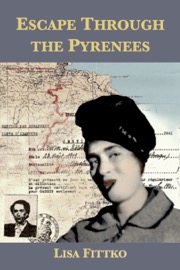 paperback $19.95; $9.99 on Kindle, Nook, Apple Books, Kobo, Google Play
paperback $19.95; $9.99 on Kindle, Nook, Apple Books, Kobo, Google Play(cover by Susan Erony)
Escape Through the Pyrenees by Lisa Fittko (translated from the German by David Koblick; 83,000 words and 22 illustrations)
“This memoir documents the fate of German expatriates, Jews, antifascists and socialists before and immediately following France’s defeat in World War II. Escape Through the Pyrenees is set in a concentration camp called Gurs and in the various border checkpoints in southern France, along the coast and in the Pyrenees. Fascism is shown not to be a monopoly of any people. If the Germans excelled at it, Lisa Fittko shows, many French officials occasionally outdid them. Against a backdrop of chaos as refugees flee the Gestapo, the gap between law and any true code of honor becomes glaringly evident. Ms. Fittko and her husband, Hans, were socialists, and their commitment to sharing impelled them to risk their lives to lead refugees, including the critic Walter Benjamin, over the Pyrenees to Spain. The author takes delight in describing the people she met — the 70-year-old female hobo, for example, whom Ms. Fittko encountered in the death ward of a French hospital and who read Baudelaire and sang the Marseillaise at the top of her voice. This woman was a rebel not against fascism but against institutionalization of any sort. It is in portraits like this that Escape Through the Pyrenees, well translated from the German by David Koblick, transcends the documentary formula and captures the poetry of human character.” — Freema Gottlieb, The New York Times
“[A] worthy account of French wartime cowardice and xenophobia and of the brave souls who defied officialdom.” — Publishers Weekly
“Lisa Fittko had no room for self-pity. Their campaigns against terror were pure struggles; [her] accounts, even allowing for the retouching of memory, are pure too.” — Smithsonian
“[T]his memoir [...] is unique in the literature of the resistance... the book truly reads as a suspense novel... The author made a valuable contribution to the literature of the persecuted in World War II.” — Vera Laska, International Journal on World Peace
“[T]he story of a little-known dimension of the fight against Hitler.” — Shofar
“[A] gripping book.” — Alfred G. Frei, The Journal of Modern History



